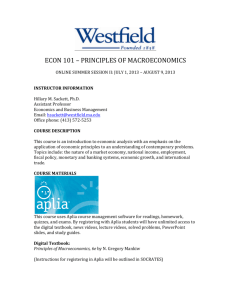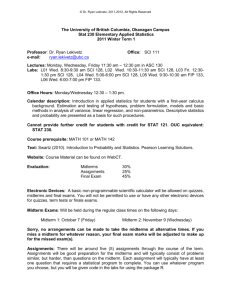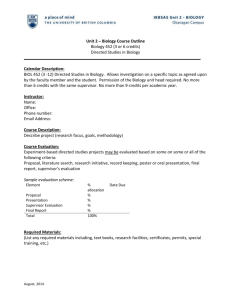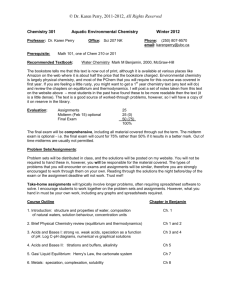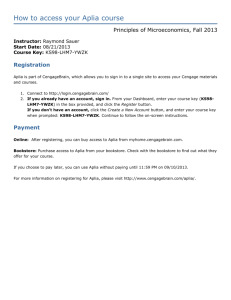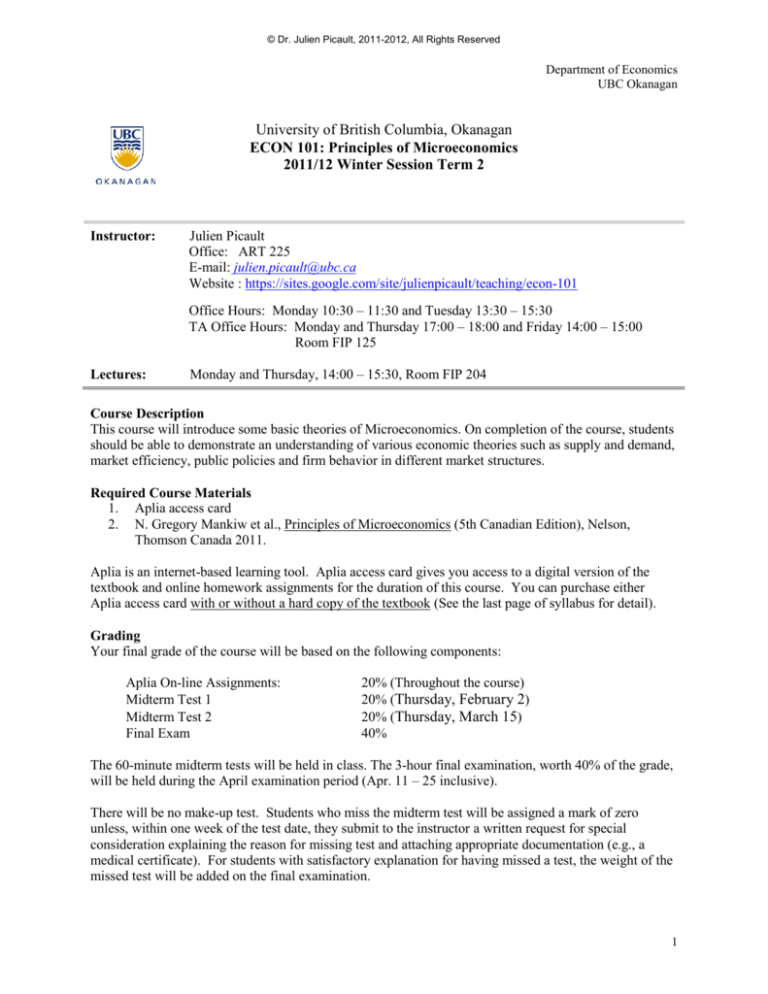
© Dr. Julien Picault, 2011-2012, All Rights Reserved
Department of Economics
UBC Okanagan
University of British Columbia, Okanagan
ECON 101: Principles of Microeconomics
2011/12 Winter Session Term 2
Instructor:
Julien Picault
Office: ART 225
E-mail: julien.picault@ubc.ca
Website : https://sites.google.com/site/julienpicault/teaching/econ-101
Office Hours: Monday 10:30 – 11:30 and Tuesday 13:30 – 15:30
TA Office Hours: Monday and Thursday 17:00 – 18:00 and Friday 14:00 – 15:00
Room FIP 125
Lectures:
Monday and Thursday, 14:00 – 15:30, Room FIP 204
Course Description
This course will introduce some basic theories of Microeconomics. On completion of the course, students
should be able to demonstrate an understanding of various economic theories such as supply and demand,
market efficiency, public policies and firm behavior in different market structures.
Required Course Materials
1. Aplia access card
2. N. Gregory Mankiw et al., Principles of Microeconomics (5th Canadian Edition), Nelson,
Thomson Canada 2011.
Aplia is an internet-based learning tool. Aplia access card gives you access to a digital version of the
textbook and online homework assignments for the duration of this course. You can purchase either
Aplia access card with or without a hard copy of the textbook (See the last page of syllabus for detail).
Grading
Your final grade of the course will be based on the following components:
Aplia On-line Assignments:
Midterm Test 1
Midterm Test 2
Final Exam
20% (Throughout the course)
20% (Thursday, February 2)
20% (Thursday, March 15)
40%
The 60-minute midterm tests will be held in class. The 3-hour final examination, worth 40% of the grade,
will be held during the April examination period (Apr. 11 – 25 inclusive).
There will be no make-up test. Students who miss the midterm test will be assigned a mark of zero
unless, within one week of the test date, they submit to the instructor a written request for special
consideration explaining the reason for missing test and attaching appropriate documentation (e.g., a
medical certificate). For students with satisfactory explanation for having missed a test, the weight of the
missed test will be added on the final examination.
1
© Dr. Julien Picault, 2011-2012, All Rights Reserved
Department of Economics
UBC Okanagan
Course Outline
Introduction
Supply and Demand: How Market Work
Supply and Demand: Markets and Welfare
The Economics of the Public Sector
Firm Behaviour and the Organization of the Industry
The Economics of Labour Markets (if we have time)
Topics for Further Study (if we have time)
Academic Integrity
The academic enterprise is founded on honesty, civility and integrity. As members of this enterprise, all
students are expected to know, understand, and follow the codes of conduct regarding academic integrity.
At the most basic level, this means submitting only original work done by you and acknowledging all
sources of information or ideas and attributing them to others as required. This also means you should
not cheat, copy, or mislead others about what is your work. Violations of academic integrity (i.e.,
misconduct) lead to the breakdown of the academic enterprise, and therefore serious consequences arise
and harsh sanctions are imposed. For example, incidences of plagiarism or cheating usually result in a
failing grade or mark of zero on the assignment or in the course. Careful records are kept in order to
monitor and prevent recidivism.
A more detailed description of academic integrity, including the policies and procedures, may be found
at: http://web.ubc.ca/okanagan/faculties/resources/academicintegrity.html.
Disability Resources
If you require disability related accommodations to meet the course objectives, please contact the
Coordinator of Disability Resources located in the Student Development and Advising area of the student
services building. For more information about Disability Resources or about academic accommodations
please visit the website at: http://www.okanagan.students.ubc.ca/current/disres.cfm.
Equity, Human Rights, Discrimination and Harassment
UBC Okanagan is a place where every student, staff and faculty member should be able to study and
work in an environment that isfree from human rights based discrimination and harassment. If you require
assistance related to an issue of equity, discrimination or harassment, please contact the Equity Office,
your administrative head of unit, and/or your unit’s equity representative.
UBC Okanagan Equity Advisor: ph. 250-807-9291; email equity.ubco@ubc.ca
Web: www.ubc.ca/okanagan/equity
Unit Equity Representatives:http://www.ubc.ca/okanagan/equity/programs/equityreps/unitcontacts.html
2
© Dr. Julien Picault, 2011-2012, All Rights Reserved
Department of Economics
UBC Okanagan
How to access your Aplia course
Course Name: Principles of microeconomics
Instructor: Julien Picault
Start Date: 01.12.12
Course Key: 882F-3YE3-5LKU
You can begin working on your homework as soon as you register!
• In this course, you will use a textbook and Aplia's website.
• You will have access to a digital version of your textbook on Aplia through the end of this
course.
• If you wish to have a hardcopy of your textbook, you can save money if you buy the course
package at the UBCO bookstore. See payment options below.
Registration
1. Connect to http://login.nelsonbrain.com.
2. If you already have an account, sign in. From your Dashboard, enter your course key in the box
provided, and click the Register button.
If you don't have an account, click the Create an Account button, and enter your course key when
prompted. Continue to follow the on-screen instructions.
Purchase Options
The UBCO bookstore offers you two options.
Option 1: Buy Aplia access card alone online at the price of $80.00.
• Aplia access card gives you access to your on-line assignments and the subscription of digital
copy of the text for the duration of this course.
Option 2: Buy the course package at the price of $145. (Recommended)
• The package includes Aplia access card, a hard copy of the text and the study guide.
3


